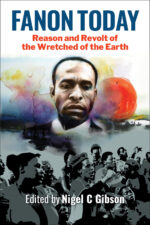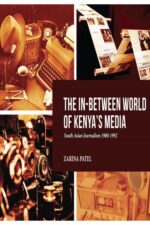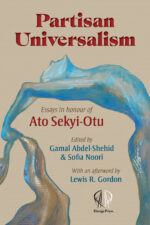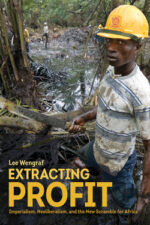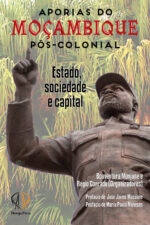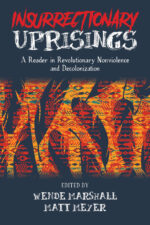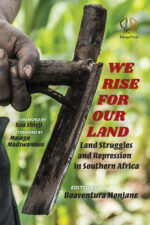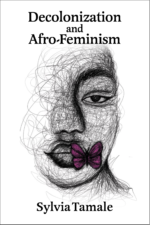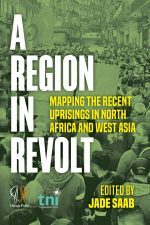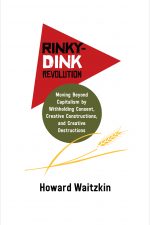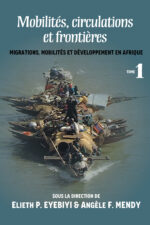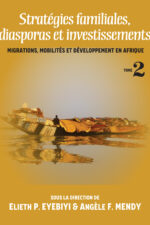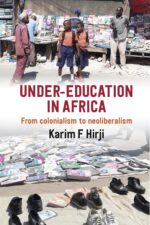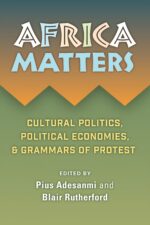-
Religion, Politics and Society: A progressive primer
USD $ 6.99 – USD $ 46.00Religion, Politics and Society covers the four major global religions—Hinduism, Buddhism, Christianity and Islam—several minor religions—African Folk Religion, Ahmadiyya Muslim Jamaat, Confucianism, Seventh Day Adventism, Sikhism—as well as Secularism. Its foundational premise is that while their spiritual beliefs differ, all humans are equal in dignity and have equal rights. No belief system is more exalted than the rest. There are no chosen people; there is no chosen religion. We all are a part of the global human family. Our religious and cultural diversity is a cause for celebration, not conflict. (see more below under Details)
-
Social Media and Capitalism: People, Communities and Commodities
This important discussion of the most recent developments in the commodification of media and culture goes beyond market-based analyses of relations of exchange and locates their central dynamic in the alienated forms of human relations that characterize contemporary forms of the capitalist mode of production.
—Peter Hudis, Professor of Philosophy and Humanities at Oakton Community College and author of Marx’s Concept of the Alternative to Capitalism) and Frantz Fanon: Philosopher of the Barricades.
A vital exploration of Marxist and critical theory in relation to the lived reality of a society permeated by social media; features a strong discussion of the Global South.
—Kevin B. Anderson, Professor of Sociology at University of California, Santa Barbara, author of Lenin, Hegel, and Western Marxism: A Critical Study, Marx at the Margins: On Nationalism, Ethnicity and Non-Western Societies, and Dialectics of revolution : Hegel, Marxism, and its critics through a lens of race, class, gender, and colonialism (Daraja Press, 2020)
Technology is one of the central elements of contemporary human life. The world as one knows it today is a space increasingly mediated by technological interventions, be it in the field of contemporary cultural expressions or political, organizational forms. Social media has played an important role in this transformation. Gone are the days when social media was merely a conduit for conversations. Today, it is a diverse field of operations spanning advertising mechanisms, branding processes and even direct commercial exchanges between users: the prime focus of this particular book. The book analyses real-world interactions, interviews and observations through the theoretical framework provided by Marxist political economy and social theory. It draws upon the theoretical scope provided by Marx’s dialectical methods of social analysis and uses it to unearth the effects that trading and commercial activities performed through virtual communities have on society and individuals.
-
Fanon Today: Reason and Revolt of the Wretched of the Earth
It is entirely fitting that in this fine book, those engaged in the radical praxis of healing are movements that are subverting the institutions of private property as a path to an emancipated society. Fanon’s legacy today is kept alive in their struggle. Raj Patel, Frantz Fanon’s revolutionary spirit lives on
Coming sixty years after the publication of The Wretched of the Earth and his death from leukemia at the age of 36, Fanon Today: Reason and Revolt of the Wretched of the Earth, edited by activist and scholar Nigel Gibson, provides a solid overview of the relevance of Frantz Fanon to the work of those of us who still believe that a just and humane world is both necessary and possible. Throughout the volume the contributors provide space and examples of a Fanonist development of radical humanism, which provides for the psychological development of the person within the context of consciousness raising, collective action and structural change. Through a variety of examples, the book also clearly demonstrates the fact that the agents of change do not simply have to be the usual suspects of the industrial working class but includes – and must include – the peasantry and the various manifestations of the lumpenproletariat. As noted by Gibson, “Fanon’s new humanism is a politics of becoming, based on the fundamental transformation of paralyzed Black and colonized subjects into new human beings through the liberation struggle” (p. 300). Timothy Wild, Review of African Political Economy. Dec 6, 2021.
This monumental compendium of cosmopolitical provocations and decolonial insights does more than just correct the misreadings that have threatened recently to engulf and mystify Fanon’s work. These exhilarating essays and commentaries put his incendiary contribution back where it belongs: in the insurgent speculations and reconstructive efforts of creative thinkers struggling to transform the imperiled predicament of our planet. —Paul Gilroy, founding Director of the Sarah Parker Remond Centre for the Study of Race and Racism at University College London
*This is a wonderful book. It succeeds in extracting Fanon’s thought (the Wretched/Damned of the Earth in particular) from the realms of academia, Cultural Studies and Afropessimism and to locate it squarely where it originally belonged: within the domain of political practice, outside of which it makes very little sense. In academic reading, one remains a prisoner of the limits of the text itself; in a political reading, the text becomes a vehicle for addressing the problems raised by active militancy. Gibson has succeeded in bringing together an international array of brilliant contributors who all prove to be eloquent witnesses to the continued relevance of Fanonian concepts—such as the Manichean character of (neo)colonialism and racism, the corrupt nature of the so-called ‘national bourgeoisie’ and the continued relevance of ‘national consciousness’—in the contemporary expanded reproduction of racial capitalism on a world scale. What is particularly fascinating is the way in which intense studies of Fanon’s writings within the United States carceral system and South African informal settlements among other locations have enabled the production of political thought that takes Fanonian dialectical categories beyond their original subjective context, into concrete political practices combining the necessary experiences of particular struggles with conceptions of universal freedom. This is a militant work for militant readers. —Michael Neocosmos, Emeritus Professor in Humanities, Rhodes University, South Africa.
*
There is not one time, not one aspect of the world’s experience, that does not give credence to Fanon’s precepts. Our collective human history has taught us that the human is bound to face attempts to crush her or his integrity, to condemn them to despicable exploitation, treacherous oppression. It is in the very nature of that experience that we have learned how Fanon shall never die. For his precepts and action remain always universally relevant. This is also what Fanon Today affirms. The book is fundamentally relevant and useful. It reminds us that in the face of exploitation and repression, the human and the humanist will always find ways to combat those. Dense and eclectic, strategically thought out and organized, critically stimulating, this book is as incisive as it is compelling. —Hanétha Véte-Congolo, President of the Caribbean Philosophical Association
*
In this collective labor of love of the here and the now, voices of the damned—that pathologized, incarcerated, and evicted majority of the world’s population—rise! From Algeria to Brazil, Ireland to Kenya, Palestine to Portugal, South Africa to Trinidad and beyond, they are breathing life into and actively humanizing our precious and oh-so-fragile earth. Meeting brutal structural violence with the courageous construction of democratizing institutions that nurture mental health, well-being, and solidarity, Fanonian praxis emerges in each chapter. Evincing a thoughtful agency that questions everything, the volume forges new relations spanning generations and locales. Through it, sixty years since the publication of Les damnés de la terre, Fanon’s insights reach out to us, beckoning us to carry on the tireless work of building a world of the “we.” —Jane Anna Gordon, author of Statelessness and Contemporary Enslavement
*
Coming out of the pandemic, the greatest challenge is how we express our anger, how we make it a digna rabia, a “dignified rage”, as the Zapatistas say. Fanon must be part of the answer. This magnificent collection of essays helps us to focus our minds on that challenge, to direct our anger to the task of making a different world. An important book, an exciting book. —John Holloway, author of We are the Crisis of Capital: A John Holloway Reader
*
Fanon Today: Reason and Revolt of the Wretched of the Earth, edited and cordinated by Nigel C Gibson, gives the opportunity to several intellectuals and activists with different backgrounds from Brazil to Algeria, from Pakistan to South Africa, to tell how the struggle against injustice and racism inscribe itself into the continuity of the Fanonian visionary legacy. Not to be missed! —Hassane Mezine, Photographer, Film Director of Fanon hier, aujourd’hui
*
This is an indispensable book. It brings together many among the overlooked communities for whom Fanon actually wrote—the dispossessed, the downtrodden, the organic voices rising from the depths of misery on the verge of despair. What better way to commemorate the six decades since the publication of Les damnés de la terre than to remind readers of that great work that the people in solidarity with whom its ideas were generated not only speak but also write? Read and learn from these voices as, in those proverbial revolutionary words, the struggle continues. —Lewis R. Gordon, author of Freedom, Justice, and Decolonization
*
In Fanon Today, Nigel Gibson brings to life the Fanonian project of exploring the implications of radical theory in contemporary sites of struggles. This groundbreaking book commemorates the 60th anniversary of the Wretched of the Earth by exploring its significance in the work of intellectuals and organizers active in radical social movements. Fanon Today is a timely book about the turbulent present and its connections to the long history of racial capitalism. It is a landmark addition to the field of Fanonian studies and an absolutely necessary reading for anyone interested in decolonial thought and social movements. —Yasser Munif, author, The Syrian Revolution: Between the Politics of Life and the Geopolitics of Death*
Fanon Today does not just bring Fanon into the immediate present, it also restores Fanon as a thinker of praxis, of organisation and struggle. There are a growing number of attempts to retrieve Fanon’s thought from its immediate historical context and put it to work in the present. But there are very few that show much interest in the fact that most of Fanon’s work was produced and grounded within struggle, within popular struggle. In keeping with Fanon’s own internationalism his thought is brought into struggles in Palestine, Pakistan, Ireland, South Africa, Kenya, the prisons in the United States and more. The worldliness of the work gathered here speaks, implicitly but lucidly, to the spirit of a thinker who was, always, in motion towards the world. Edited by Nigel Gibson, a leading Fanon scholar, including work by a group of exciting younger thinkers, and graced by a contribution from Ato Sekyi-Otu, also one of the best Fanon scholars, and a singular philosophical presence in the examination of the contemporary African condition, the book has real intellectual heft. It is essential reading for anyone who aims to engage Fanon as a comrade in struggle rather than solely as an interlocutor in more isolated and abstracted forms of academic theorizing. — Richard Pithouse, Editor, New Frame and author of Being Human After 1492
Fanon Today is a dense and rich text written by authors from across the world interested in examining societal unrest and oppression through the lens of Fanon’s ideas. In the introduction, Gibson notes that Fanon’s Les Damnés de la Terre still resonates, 60 years after publication, due to the multiple crises we face and the realities of ‘those struggling not only to survive but also be free’. … the focus on mental health is woven through- out, as it examines the impact that colonialism and imperialism have on the individual and collective psyches of oppressed communities. Fanon Today is helpfully divided into three parts: Fanonian Militants, Still Fanon and Fanonian Practices. —Kairo Maynard. Dramatherapy 42(1-3) 78-9
-
The In-Between World of Kenya’s Media: South Asian Journalism, 1900-1992
This book, originally published by AwaaZ in Kenya, provides insights into journalists of Indian origin who wrote about the struggles of Kenyan people.
-
Partisan Universalism: Essays in Honour of Ato Sekyi-Otu
Critically engaging Ato Sekyi-Otu’s notion of partisan universalism, this timely volume of essays speaks directly to the onto-metaphysical issues that will give Africana thought the new foundations that will enable it to move beyond the lin- guistic turn, brush aside the ashes of Afro-pessimism, engage Badiou’s new mathematical universalism, and to launch new projects of liberation on decolonized grounds of greater epistemic independence. A must read for all concerned with the future of Africana theory and praxis. — Paget Henry, author of Caliban’s Reason.
Responding to the invitation ‘to re-member severed but shareable things’, these lovers of truth, freedom, and dignity celebrate the searing intellect, generosity, wit, and compassion of the person and the scholar Ato Sekyi-Otu. … Combined with Sekyi-Otu’s autobiographical reflections of learning to be Black in the United States and insistence that Afropessimism turns the perverse ontology of the antiblack world into a Black ontology, this is a precious contribution. Not to be missed! —Jane Anna Gordon, author of Statelessness and Contemporary Enslavement and co-editor (with Drucilla Cornell) of Creolizing Rosa Luxemburg
Ato Sekyi-Otu’s thought is one of the most important and exciting in Africa today. The texts compiled in this volume celebrate and engage with the work of Sekyi-Otu … They bear eloquent witness to Sekyi-Otu’s stature as a thinker and to his consistent commitment to the universalization of humanity in both theory and practice. Deeply anchored in African cultures and modes of life, Sekyi-Otu has shown how ideas of human universality are ingrained in African popular sayings and proverbs and are regularly reflected in artistic creations. — Michael Neocosmos, Emeritus Professor in the Humanities, Rhodes University, South Africa
This anthology in honour of Ato Sekyi-Otu is indispensable for those concerned with Frantz Fanon’s ideas of ‘ false’ and ‘ true ‘ decolonisation and about social humanist critique of post-structuralism’ s truncated version of anti-colonialism. Sekyi-Otu accomplishes precisely such a critique in his Fanon’s Dialectic of Experience and in Left Universalism, Africacentric Essays. The essays here are exemplars of such a critique which, together with Fanon and Sekyi -Otu, build a legacy for envisioning a post-imperialist world. The authors of this volume rescue post-colonial studies from a stale and unfruitful post-structuralist reading of anti-colonialism by positing an apparent paradox of ‘left ‘ or ‘ partisan’ universalism which can then be dialectically resolved. Intellectually and politically active at once, this anthology shows how Sekyi-Otu and his co- authors can help the reader to move beyond a binary and solipsistic stance towards a project of a real emancipation, a ‘ true ‘ decolonisation. In this neither the living experience individual nor the collectivity implied in the notion of the human lose their specificity and universality. — Himani Bannerji, Professor Emeritus and Senior Scholar, Department of Sociology, York University
This collection of essays celebrates the work of Ato Sekyi-Otu as a scholar, teacher and friend, marking his extraordinary contribution to the philosophy, politics and praxis of liberation. As Ato Sekyi-Otu has argued in his most recent book, Left Universalism, Africacentric Essays (Routlege 2019), universalism is an ‘inescapable presupposition of ethical judgment in general and critique in particular, especially indispensable for radical criticism of conditions of existence in postcolonial society and for vindicating visions of social regeneration’. Universalism must and can only be partisan. Edited by Gamal Abdel-Shehid and Sofia Noori, the collection includes essays by Stefan Kipfler, Patrick Taylor, Sophie Mcall, Gamal Abdel-Shehid, Jeremy M. Glick, Nigel C. Gibson, Jeff Noonan, Esteve Morera, Tyler Gasteiger, Olúfeṃ́i Táíẃò, Susan Dianne Brophy, Nergis Canefe, Chistoher Balcom, Lewis Gordon, and by Ato Sekyi-Otu himself.
CONTENTS
- Introduction: Gamal Abdel-Shehid
- Fanon for a post-imperial world: On universals and other human matters: Stefan Kipfer
- The Sea Menagerie: Esi Edugyan’s Atlantic: Patrick Taylor
- Reconsidering Fanon’s language of recognition in Indigenous studies: Sophie McCall
- On Fanon and Lacan: Continuities and structural psychiatry: Gamal Abdel-Shehid
- Aimé Césaire’s Two ways to lose yourself: The Exception and the rule: Jeremy M. Glick
- This Africa to Come: Nigel C. Gibson
- Speaking for, speaking through, speaking with: Abstract and concrete universality in the struggle for human emancipation: Jeff Noonan
- Universality: Notes towards rethinking the history of philosophy: Esteve Morera
- Husserl and Tran Duc Thao: Crisis, renewal, and the ontology of possibility: Tyler Gasteiger
- Can Kwame Gyekye’s moderate communitarianism take the individual seriously? Olúfeṃ́i Taíẃò
- ‘Innocuous Nihilism’, social reproduction and the terms of partisanship: Susan Dianne Brophy
- Marxism, Law and the Global South: Asiatic Mode of Production Debates, The Legal Subject and the Promise of Left Universalism: Nergis Canefe
- Universalism and immanent critique in ‘The End of Progress and Left Universalism’: Christopher Balcom
- CON-TEXTS OF CRITIQUE: Ato Sekyi-Otu
- Afterword: Lewis Gordon
- About the contributors
-
Extracting Profit: Imperialism, Neoliberalism and the New Scramble for Africa
A piercing historical explanation of poverty and inequality in African societies today and the social impact of resource-driven growth, Extracting Profit explains why Africa, in the first decade and a half of the twenty-first century, has undergone an economic boom. Rising global prices in oil and minerals have produced a scramble for Africa’s natural resources, led by investment from U.S., European and Chinese companies, and joined by emerging economies from around the globe. African economies have reached new heights, even outpacing rates of growth seen in much of the rest of the world. Examined through the lens of case studies of the oil fields of the Niger River Delta, the Chad-Cameroon Pipeline and the East African infrastructure boom, this period of “Africa rising” did not lead to the creation of jobs, but has instead fueled the extraction of natural resources, profits accruing to global capital, and an increasingly wealthy African ruling class.
Extracting Profit argues that the roots of today’s social and economic conditions lie in the historical legacies of colonialism and the imposition of so-called “reforms” by global financial institutions such as the World Bank and International Monetary Fund. The chokehold of debt and austerity of the late twentieth century paved the way for severe assaults on African working classes through neoliberal privatization and deregulation. And while the scramble for Africa’s resources has heightened the pace of ecological devastation, examples from Somalia and the West African Ebola outbreak reveal a frightening surge of militarization on the part of China and the U.S.
Yet this “new scramble” has not gone unchallenged. With accounts of platinum workers’ struggles in South Africa, Nigerian labor organizing and pro-democracy upheavals in Uganda and Burkina Faso, Extracting Profit offers several narratives of grassroots organizing and protest, pointing to the potential for resistance to global capital and fundamental change, in Africa and beyond.
And in an updated Preface, the author analyses the implications of the Covid-19 pandemic and escalating climate emergency, as both the crises and resistance to extraction accelerate across the continent.
Reviews-
“Lee Wengraf’s Extracting Profit – Imperialism, Neoliberalism and The New Scramble for Africa is at once historical and contemporary. It unpacks ongoing resource crimes by analytically exposing its historical roots and pointing to ways by which the oppressed can cut off the bonds that lock in their subjugation.” —Nnimmo Bassey, Director, Health of Mother Earth Foundation
“Lee Wengraf provides an important reminder that Africa’s position within the world economy is heavily determined by its unequal insertion into the global capitalist system and ongoing manifestations of imperialism.” –James Chamberlain, Sheffield Political Economy Research Institute
“Lee Wengraf’s Extracting Profit provides a breathtakingly detailed account and analysis of some of the major socioeconomic ills that have been plaguing Africa for centuries. Amongst the host of issues she tackles, arguably the most consequential are mass poverty in African societies, their indefensible economic inequalities and the steady plundering of the continent’s resources, starting from the slave-trade era up till the present-day.” –Remi Adekoya, Review of African Political Economy
“Extracting Profit offers several narratives of grassroots organizing and protest, pointing to the potential for resistance to global capital and fundamental change, in Africa and beyond.” –Developing Economics
“Evidently, this book is well-researched and it contributes to the expansion of the frontiers of Marxist scholarship on Africa’s development dilemma within the global capitalist order. This book lends credence to the pioneering works of such notable radical scholars as Andre Gunder Frank, Walter Rodney, and Samir Amin among several others. It should be read by students and teachers of political economy, development studies, Marxism and philosophy.” –Marx & Philosophy Review of Books
“Extracting Profit provides a great arch of scutiny from the earliest carve-up of the African continent, through colonialism, war, imperialism, to the recent neoliberal takeover. The book demonstrates the continued importance of Marxist analysis on the continent, asserting the centrality of class analysis and a project of revolutionary change. Wengraf provides us with a major contribution, that highlights contemporary developments and the role of China on the African continent that has perplexed and baffled scholars. An indispensable volume.” —Leo Zeilig, author of Frantz Fanon: The Militant Philosopher of Third World Revolution
“The history of resource frontiers everywhere is always one of lethal violence, militarism, empire amidst the forcing house of capital accumulation. Lee Wengraf in Extracting Profit powerfully reveals the contours of Africa’s 21st century version of this history. The scramble for resources, markets, and investments have congealed into a frightening militarization across the continent, creating and fueling the conditions for further political instability. Wengraf documents how expanded American, but also Chinese, presence coupled with the War on Terror, point to both the enduring rivalry among global superpowers across the continent and a perfect storm of resource exploitation. Wengraf offers up a magisterial synopsis of the challenges confronting contemporary Africa.” —Michael Watts, University of California, Berkeley
“One of the most well-known stylized facts of Africa’s recent growth experience is that it has been inequality-inducing in ways that previous growth spurts were not. Lee Wengraf, in her new book Extracting Profit , expertly utilises the machinery of Marxian class analysis in making sense of this stylized fact. Along the way we learn much about Africa’s historical relationship with imperialism and its contemporary manifestations. This book should be required reading for all those who care about Africa and its future.” —Grieve Chelwa, Contributing Editor, Africa Is A Country
“In recent years countries in the African continent have experienced an economic boom—but not all have benefited equally. Extracting Profit is a brilliant and timely analysis that explodes the myth of “Africa Rising,” showing how neoliberal reforms have made the rich richer, while leaving tens of millions of poor and working class people behind. Lee Wengraf tells this story within the context of an imperial rivalry between the United States and China, two global superpowers that have expanded their economic and military presence across the continent. Extracting Profit is incisive, powerful, and necessary: If you read one book about the modern scramble for Africa, and what it means for all of us, make it this one.” —Anand Gopal, author, No Good Men Among the Living: America, the Taliban, and the War Through Afghan Eyes
“Thorough and thoughtful, Wengraf’s book has a radical depth that underscores its significance. It’s definitely a must-read for anyone who cherishes an advanced knowledge on the exploitation of Africa as well as the politics that undermines Africa’s class freedom.” —Kunle Wizeman Ajayi, Convener, Youths Against Austerity and General Secretary of the United Action for Democracy, Nigeria
“Extracting Profit is a very important book for understanding why the immense majority of the African population remain pauperised, despite impressive growth rates of mineral-rich countries on the continent. It continues the project of Walter Rodney’s How Europe Underdeveloped Africa. And in several ways, it also goes beyond it, capturing the changing dynamics of global capitalism 45 years after Rodney’s magnus opus.
In this book, Lee Wengraf debunks the myth of “Africa Rising” and the supposed expansion of an entrepreneurial middle-class, revealing “reforms” imposed by international financial institutions as mechanisms for fostering imperialism in an era of sharpening contradictions of the global capitalist economy. The adverse social, economic, political and environmental impact of these are elaborated on as a systemic whole, through the book’s examination of the sinews of capital’s expansion in the region: the extractive industries.
But, Wengraf does not stop at interrogating the underdevelopment of Africa. Her book identifies a major reason for the failures of national liberation projects: while the working masses were mobilised to fight against colonial domination, the leadership of these movements lay in the hands of aspiring capitalists, and intellectuals. The urgency of the need for a strategy for workers’ power internationally, she stresses correctly, cannot be overemphasized.
Reading Extracting Profit would be exceedingly beneficial for any change-seeking activist in the labour movement within and beyond Africa.” —Baba Aye, editor, Socialist Worker (Nigeria)
-
-
Aporias de Moçambique pós-colonial: Estado, Sociedade e Capital
USD $ 24.00Este livro escrutina o impacto significativo da independência em diferentes sectores da sociedade moçambicana. Quarenta e cinco anos após a independência, Moçambique conheceu várias transformações. O Moçambique pós-colonial é hoje, em muitos aspectos, diferente do Moçambique colonial. No entanto, existem muitas questões permanentes relativas a essas transformações e ao seu impacto na maioria do povo moçambicano.
Ao salientar as contradições de todos os processos políticos e sociais em Moçambique pós-colonial, neste livro levantamos questões que visam desconstruir alguns mitos sobre o país.
Temas como estado, desenvolvimento, política, cultura, nação, políticas públicas, políticas agrárias e outros são questionados em abordagens teóricas inovadoras e progressivas, a fim de compreender o passado, o presente e o futuro de Moçambique numa perspectiva crítica. Por conseguinte, cada tema do livro é tratado de uma perspectiva crítica para melhor captar as aporias dos últimos quarenta e cinco anos de independência.
A liberalização política que deveria permitir mais partilha de poder e mais respeito pelos direitos políticos e cívicos consolidou, pelo contrário, um regime autoritário que utiliza a ajuda internacional e os benefícios da indústria extractiva não para transformar o país, mas para construir a sua hegemonia política, económica e social em todo o país.
Defendemos neste livro a tese de que é impossível compreender a verdadeira dinâmica social, política, económica e cultural sem considerar o “povo” como uma categoria essencial de análise.
Apesar de muitas transformações positivas que ocorreram após a independência, Moçambique ainda preserva muitas heranças coloniais e, portanto, várias transformações estão ainda por implementar.
Neste trabalho afirmamos que Moçambique é governado por elites que são incapazes de descolonizar o projecto de desenvolvimento que ainda está ancorado na agenda da capital internacional.
O objectivo deste livro é dar uma melhor compreensão do que tem sido o processo de independência em Moçambique e porque é que o país pós-colonial ainda é colonial na sua estrutura política e económica. Assim, são dados muitos exemplos para dar ao leitor a possibilidade de confrontar as perspectivas teóricas aqui utilizadas com os casos concretos.
Todos os estudos deste livro mostram que quarenta anos de independência não foram vividos da mesma forma pelas elites que governam o país e pelas populações que vivem sob o seu domínio. Por um lado, as elites no poder e os seus parentes beneficiaram, e ainda beneficiam dos recursos do país, enquanto que uma grande parte da população continua à espera das promessas da independência.
De um ponto de vista político a económico, os estudos que compõem o livro destacam como o “desenvolvimento” em Moçambique tem estado em contradição com as necessidades do país. Significa que o actual modelo de desenvolvimento responde muito mais à capital internacional do que à transformação social de Moçambique. -
Insurrectionary Uprisings: A Reader in Revolutionary Nonviolence and Decolonization
Insurrectionary Uprisings is a compendium of essays that explore what it will take to win a world based on love and justice. From historical writing, including Thoreau, Gandhi and Arendt, to essays that address the multiple crises we face in the 21st century, the volume brings together authors and thinkers from around the globe. With an emphasis on the quotidian violence of racial monopoly capitalism and Western imperialism, Insurrectionary Uprisings insists that the possibility of revolutionary nonviolence rests, in part, on decolonization and decoloniality and a thorough analysis of the deep and violent roots of racial capitalism, settler colonialism and heteropatriarchy. Fannie Lou Hamer’s testimony at the 1964 Democratic Convention underscores the inherent violence that saturates life in the U.S., while Cabral’s “Message to the People of Portugal” challenges the working class of imperial Portugal to recognize their kinship and to form alliances with the people of Guinea-Bissau. The very different strands of activist thinkers who comprise the book centre it on the experience of the global majority.
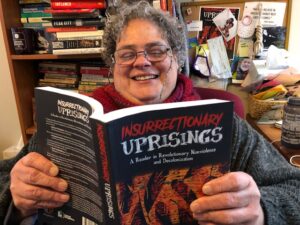
Editor Wende Marshall reading Insurrectionary Uprisings! -
Being human after 1492
Richard Pithouse’s extraordinary overview of the what is means to be human after 1492:
… On 9 August 2014, Michael Brown, an unarmed black man, was shot dead by a white police officer in Ferguson, Missouri. The movement that grew out of the rebellion that followed inaugurated a new sequence in the struggle against racism in the United States. As with previous sequences in that struggle it quickly acquired an international dimension, including here in South Africa. One aspect of this international moment has been an urgent confrontation with the reality that what Césaire called ‘abstract equality’ does not, on its own, mark an end to the racialization of life.
In the United States, and elsewhere, there is a sense that history is as present as it is past. Just over a decade ago, Baucom observed that “what-has-been is, cannot be undone, cannot cease to alter all the future-presents that flow out of it. Time does not pass or progress, it accumulates”. It is the sense that time accumulates into the present that has often led to the invocation of William Faulkner’s famous line from Requiem for a Nun in discussions about race: “The past is never dead. It’s not even past.”
The past does not merely haunt or shape the present via the enduring power of deep and impersonal structural forces. Across Europe, and in settler societies like Australia, Brazil and the United States, racism is an increasingly explicit and menacing presence at the centre of political and social life. White revanchism has rallied, often under demagogic leadership, to secure the racial order that emerged from the event of 1492. It has already resulted in Brexit in England, the impeachment of an elected President in Brazil and the election of a figure as grotesque as Trump in the United States.
We will not be able to transcend the epoch that began in 1492 without a politics that can confront and defeat this revanchism. And we will not have transcended this epoch until “things, in the most materialistic meaning of the word” are, as Fanon insists, “restored to their proper places”. But the catastrophe from which we are all derived is not solely a matter of material dispossession and accumulation. As Michael Monahan argues, in conversation with Wynter, “the history of colonialism is also the history of the emergence of the idea of Europe and of Europeans, and . . . it is such ideas and cultural practices that inevitably shape our consciousness, conditioning what counts as normal and, ultimately, as rational”.
-
We Rise for Our Land: Land Struggles and Repression in Southern Africa
By chronicling rural people’s struggles across diverse contexts, this collection gives us some signposts of emancipatory politics in the African countryside. Accessible and theoretically grounded, this exciting collection by leading African scholar-activists chronicles rural people’s struggles, from resistance to alternatives. Activists and scholars engaged with rural struggles need to read this book. —Ruth Hall, professor, Institute for Poverty, Land and Agrarian Studies, University of the Western Cape, South Africa
A remarkable, well-argued and theoretically diverse collection of essays on the land question in Southern Africa, a topic as old as colonialism and as new as the newest impositions of global capitalism. Land struggles and resistance in a new and powerful light.
— Boaventura de Sousa Santos, author of The End of the Cognitive Empire, 2018This book makes a powerful contribution to the existing and growing literature on land and agrarian questions in southern Africa. Empirically rich… the book is essential reading for scholars, intellectuals, students and activists involved in the everyday struggles and responses of those communities who are directly affected by neoliberal policies. Highly recommended. —Lungisile Ntsebeza, Emeritus Professor in African Studies and Sociology in the Centre for African Studies, University of Cape Town.
Co-publisher: Sam Moyo African Institute for Agrarian Studies
In recent years southern Africa has aroused the interest of domestic and foreign investors targeting several sectors. The agrarian and extractive capital has been the most penetrating in the countryside, causing land conflicts, displacement of local peasant communities and in worse cases, deaths. Being mostly neoliberally oriented, SADC states have positioned themselves in favour of capital. This collusion results in State measures that are hostile to the peasantry of their countries. The measures taken by the States, both in policies and in repressive actions, are endorsed by of high-level government officials, Ministers, Presidents, Kings and traditional Chiefs. As far as traditional chiefs are concerned, even in situations where the presence of capital is dangerous, ‘feudal’-type power relations prevail, oppressing mainly young people and women.
The peasantry and rural people in general have not, however, been passive in this process. Alone or in alliance with non-governmental organizations and activists, they have positioned themselves strongly against such dynamics and have raised their voices questioning developmentalist logics that are imposed on them, but that take away their means of production and violate their rights. In fact, resistance movements to capital are taking place throughout the region, even if the response to this has been repression by the states.
This book, which takes a scholar-activist stance, is written by authors, men and women, who critically study the dynamics of agrarian and extractive capital in southern Africa. In their academic and activist work, they seek to bring useful theoretical, conceptual and practical contributions to the struggles of agrarian and rural movements that represent the ‘subalternised’ rural and urban people. The book brings contributions in forms of chapters from DRC, Namibia, Zambia, Malawi, Zimbabwe, eSwatini (Swaziland), Mozambique, and Madagascar.
-
For the love of the struggle: Memoirs from El Salvador
The Spanish edition of this book was presented as an offering during the ceremonial mass commemorating the 32nd anniversary of the slaying of 6 Jesuit priests by the army during El Salvador’s civil war.
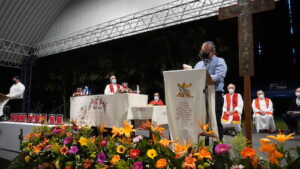
You can watch Brian Murphy interviews Andrés McKinley here.
From his home in El Salvador where he has lived over four decades, the author shares an intimate personal and political memoir that follows his remarkable journey from the comfort and security of a picturesque New England town to a stirring and heroic engagement in common cause with the struggle for peace and justice in El Salvador.
After four years as a Peace Corp worker in northern Liberia beginning in the late 1960’s, followed by a stretch back in the United States as a street worker in the ghettos of North Philadelphia, McKinley finds himself in Central America as an aid worker in 1978. He quickly becomes engulfed by the political violence of the region and engaged with the people and their struggles against five decades of military dictatorship, centuries of poverty and exploitation. The story is marked by terror, adventure and courage, by trials and tragedy redeemed by the beauty and transcendence of people in struggle.
Originally based in Guatemala heading up a Catholic relief agency, his commitment to the struggles for change in the country attracts the attention of the military, and his own government, forcing him to leave the country in late 1980. He moves to El Salvador where he begins a gradual incursion into the revolutionary struggle of this country, in a commitment that will last the rest of his life.
Interwoven with this personal journey, is the story of Teresa Rivas, her husband Antonio, and their five children, a peasant family whose commitment as catequists with the Jesuit, Rutilio Grande, led to their eventual incorporation into the guerrilla forces of the FMLN after Grande’s assassination in 1977. The book describes the circumstances under which the author meets Antonio Rivas and family in the war zones of El Salvador, falls in love with them and their cause, and commits to accompanying their struggle through its darkest hours during the most violent years of the war. It also describes their life after the war, with resettlement in the lowlands of Guazapa where many ex-combatants were building a new life.
Interwoven with these stories, is the epic of a decades-long people’s struggle for economic justice, human rights and authentic democracy in El Salvador. The book lays out the social, economic and political origins of the armed struggle that caught fire in the 1970s, and the experiences of a people in desperate pursuit of non-violent options for democratizing their country and assuring a dignified life for the impoverished and marginalized majority of its population. It explains in detail the gradual emergence of the objective and subjective conditions for revolution in El Salvador, including the difficult choice for the use of violence as the only available option for transformative change in the country.
The book also details the challenges of reconstruction after the Peace Accords that end the war in 1992, and the tragedy of opportunities lost during the immediate post-war period in the face of the ongoing resistance of traditional opponents to reform. The author—himself deeply involved during these years in support of non-violent political organizing and advocacy—describes the efforts to sustain peace and to resolve the issues that continue to threaten the country with political violence. One of these is the water crisis that threatens the viability of the nation and life itself, and the book reveals the processes of organizing behind the ultimately-successful 17 year struggle to ban metallic mining—an historic victory in 2019 approved by a vote in the National Assembly, and without precedent in the world.
As the memoir closes, the author reflects on his choice to be in El Salvador over the past 43 years, and the country as he finds it in these changing times; on the family with whom he has shared love and life there; on his continuing relationship with Antonio Rivas and his surviving family; and his gradual reconciliation, from a distance, with the country of his birth.
With a Foreword by Charlie Clements, author Witness to War (Bantam, 1984) and Former Executive Director of the Carr Center for Human Rights Policy at the Harvard Kennedy School.
Andrés McKinley has penned a beautiful, moving love story – a stunning tribute to his family and country of birth and to his family and country of re-birth. Read it also as a tribute to a generation whose best and brightest members seized the opportunity to be a part of the social justice movements that were unfolding around the world. Theirs was not a journey for fame or for fortune. Baby-boomers, read this book to remember; others, read this to understand not only the sacrifices made but, more importantly, the fulfillment gained. May others follow Andres’s path to love, wherever it may take take them. — Robin Broad (Guggenheim Fellow) and John Cavanagh (director, Institute for Policy Studies), coauthors
of The Water Defenders: How Ordinary People Saved a Country from Corporate Greed (Beacon Press, 2021).The voice is simple, authentic, articulate, and consistent and coherent throughout. Given the unique and dramatic personal story that Andrés tells, it is actually understated and quiet—restrained intensity is how I might describe it. What really sets it apart, though, is the intimacy, care and respect with which he describes and tells the stories of the Salvadorans with whom he shared life and struggle throughout these years (and for that matter the villagers in Liberia in his early Peace Corps years). … It is a work of great humility, even as it tells a heroic tale without flinching, and in great detail. Nor is he romantic about the course that the struggle has taken; he is unflinching in that as well, and so leaves history open-ended but blessed with the grace of those who struggle. — Brian K. Murphy, writer and organizer, former policy analyst at Inter Pares, who writes at MurphysLog.ca
This is a very impressive book which tells a truly remarkable personal story, without the story becoming purely personal. In fact, there is a great deal of political history in the book, which I can confirm as I also studied as well as lived through some of the Salvadorean civil war. The truly incredible Salvadorean peasants who stayed in the war zones despite army incursions and US backed aerial bombing, are just as he describes them. They led me also to a lasting respect and love for them, even with- out the long term depth of experience of the author. The way the author brings us so many personal stories is very powerful. We get to know the friends he makes and then to feel as he did, when they lost their loved ones in this horrendous violence un- leashed on the Salvadorean poor and their allies by the Salvadorean wealthy elites, their military and US backers. — Jenny Pearce, Research Professor, Latin America and Caribbean Centre, London School of Economics
Andrés McKinley’s book For the Love of the Struggle is a moving and personal account of his involvement in the fight for justice in El Salvador during the civil war of the 1980s. But more than the events he describes, with great detail and political insight, it is his love for the people of El Salvador that sets this book apart. From working with church related organizations, to joining the guerrillas in the liberated zones, to his work along the communities opposing metallic mining, it is his relation- ship with the people, particularly the humbler ones, which stands out.
Most books that deal with the civil war in El Salvador end with the signing of the Peace Accords, which put an end to the armed conflict and laid the foundation for a more democratic and just El Salvador. As important as the Peace Agreements were, they did not solve all the problems and conflicts of the country. When several rural communities were threatened in the early 2000s by the efforts of trans- national gold mining interests, they rose in defense of their rights through social organization and peaceful opposition. In spite of the repression they suffered, after 17 years of struggle they finally prevailed, showing how people united, can bring about change.
This belief is particularly important now, at a moment in which our democratic insti- tutions are being threatened precisely by those who should be the first to protect them. It is the role of organized civil society to defend what we have conquered and McKinley’s book is an excellent and timely reminder that this is something possible and necessary to achieve.— Francisco Altschul is a former Salvadoran Ambassador to the United States
-
Decolonization and Afro-Feminism – Winner of the 2022 FTGS Book Prize
A brilliant interview with Sylvia Tamale by Sylvia Bawa and Grace Adeniyi-Ogunyankin has just been published by Feminist Africa. March 3, 2023
“Africa will inevitably rise like those many heads of the hydra, but first it needs a decolonial break from the tether that ties its economies to the global capitalist market”—An interview with Sylvia Tamale
Decolonization and Afro-Feminism wins the 2022 FTGS Book Prize
The FTGS Book Committee has unanimously awarded the 2022 FTGS Book Prize to Decolonization and Afro-Feminism (Daraja Press). Sylvia Tamale’s Decolonization and Afro-Feminism makes a compelling case for unlearning imperial power relations by “shaking off” the colonial filters through which we view the world. This process, she argues, is a process of relearning that re-envisions Pan-Africanism as a more inclusive decolonizing/decolonial movement that embraces afro-feminist politics. Tamale also challenges the traditional human rights paradigm and its concomitant idea of “gender equality,” flagging instead the African philosophy of Ubuntu as a serious alternative for reinvigorating African notions of social justice.
In Decolonization and Afro-Feminism, Sylvia Tamale provides a powerful guide towards the elimination of two interconnected challenges in contemporary Africa by situating her text as “part of the narrative that does not simply commit to the struggle for decolonization, but also recognizes the dynamics of gender within the struggle for new ways of being”. – Emmah Khisa Senge Wabuke: Feminist Legal Studies https://doi.org/10.1007/s10691-021-09470-6
Overall, this book is not only about how Afro-feminism has been excluded from decolonisation efforts, but how its inclusion can nourish decolonial epistemology. …
Although it is dedicated to students of Africa, this book goes beyond an excellent teaching tool, to make important contributions to socio-political organising in fur- therance of the Afro-feminist decolonial project on the continent.—Emmah Khisa Senge Wabuke,Centre for Gender Studies, Selwyn College, University of Cambridge, Cambridge, UK. Feminist Legal Studies (2022) 30:121–123 https://doi.org/10.1007/s10691-021-09470-6
-
A region in revolt: Mapping the recent uprisings in North Africa and West Asia
A wave of mass protest movements has spread across North Africa and West Asia, including Sudan, Algeria, Iraq, Lebanon and Iran. The mass protests have much in common, from opposing authoritarian regimes and worsening economic situations to demanding radical changes in social relations. Despite their similarities, each protest movement operates under different conditions that cannot be ignored. The specific historic, political and economic contexts of each country have determined who the key actors of the uprisings are and their location across old and new divides. This book elaborates on these similarities and differences to paint a clearer picture of these movements and draw out lessons to inform future struggles.
Sam Salour summarizes A Region in Revolt: Mapping the Recent Uprisings in North Africa and West Asia, edited by Jade Saab. A collection of essays that provides a comprehensive review of the 2018-2019 wave of struggle in the region. In the third part of this multi-part series, Salour provides an introduction to the book and then outlines the essay “The Revolutionizing Nature of the Lebanese Uprising” by Jade Saab and Joey Ayoub.
Edited by Jade Saab, a Lebanese/Canadian researcher at the University of Glasgow, the contributors include Azza Mustafa and Sara Abbas (on Sudan); Hamza Hamouchene and Selma Oumari (on Algeria); Zeidon Alkinani (on Iraq); Jade Saab and Joey Ayoub (on Lebanon); and Frieda Afary (on Iran).
Insightful, timely analysis of the uprisings in Sudan, Algeria, Lebanon, Iraq and Iran. The book … demonstrates that the uprisings…carry the unyielding spirit of people’s resistance and struggle against both imperialism and local oppressive regimes.— Haifa Zangana, Iraqi novelist, author, artist, and political activist and author of Dreaming of Baghdad.
Whereas there is a plethora of books on the 2011 [Arab Spring] upsurge, this book is the only comprehensive overview of the second wave of revolt, which is here analysed from the standpoint of the popular struggle. — Gilbert Achcar, Professor at SOAS, University of London, author of The People Want: A Radical Exploration of the Arab Uprising
A rich and informed account of the popular uprisings that have emerged across the Middle East in recent years. … [T]his book is a powerful testament to the new generation of activists who continue to seek long-term revolutionary change in the region. – Adam Hanieh, author of Money, Markets, and Monarchies: The Gulf Cooperation Council and the Political Economy of the Contemporary Middle East (CUP 2018).
Last year a wave of militant protests spread across North Africa and West Asia, in a sustained, historic series of popular struggles. Emma Wilde Botta reviews A Region in Revolt: Mapping the Recent Uprisings in North Africa and West Asia edited by Jade Saab. A Region in Revolt: Mapping the Recent Uprisings in North Africa and West Asia edited by Jade Saab is the first and, to my knowledge, only comprehensive review of the uprisings that took place in Algeria, Sudan, Lebanon, Iraq, and Iran. Each chapter is written by activist-scholars from the respective country who provide an overview of each country’s specific political and economic conditions. They show that, far from being ahistoric spontaneous events, the 2019 uprisings built upon past struggles, by tracing the legacies of resistance in each country and showing how they have impacted the newly emerged movements.
A Region in Revolt captures all of the hope and inspiration of the 2019 uprisings. One of the most significant achievements of these movements is that, in the words of Hamouchene and Oumari, ‘people discovered their political will and realised they are in control of their own destiny.’ These were undeniably class revolts, fueled by anger over poverty, unemployment, austerity, and corruption. Yet, the people in the streets largely imagined themselves as citizens. The challenges of how to bring people into motion as workers, how to develop independent working-class organizations, and how to develop a political alternative to capitalism continue to be pressing. The COVID-19 pandemic has thrown another obstacle in the way. But there is no doubt that future struggles are on the horizon. A Region in Revolt helps us answer the question of what we can do now to prepare for them. – Emma Wilde Botta is a socialist activist and writer based in Oakland, California. She has written extensively on the Arab Spring, the Gulf States, Iran, and US imperialism. Her writing has appeared in TruthOut, the International Socialist Review, roape.net and Socialist Worker.
United we stand: anatomy of five revolutions: Mike Phipps reviews A Region in revolt: Mapping the recent uprisings in North Africa and West Asia, edited by Jade Saab, published by Daraja Press (Ottawa) & TNI (Amsterdam): We are nearly ten years on from the Arab Spring, a series of uprisings across the Middle East. When it began, argues Jade Saab in this important new book, it “was presented to the world through an orientalist lens… the awakening of the backwards Arab world.” For the west, it provided retroactive justification for the invasion of Iraq: “All democracy in the region needed was a nudge in the form of an illegal invasion and a million dead civilians.” This narrative allowed reactionary regimes in the region to paint the uprisings as western plots to destabilise their countries. Both these interpretations were bolstered by military interventions in Libya, Syria and Yemen. These military interventions upped the stakes considerably for any nascent popular uprising. If movements called for the fall of the regime, the regime could respond: “Do you want to become another Syria?” Yet the uprisings continued, and it is not too hyperbolic to refer to the last couple of years as a Second Arab Spring. This second wave is the focus of this book. The demands raised by these uprisings go beyond a change of political leadership: they call for a fundamental restructuring of society. The countries in question share similar political economies with an emphasis on extractivism and speculative investment. The spoils of these activities bypass ordinary people, fuelling the migration of skilled labour out of the region and massive rates of unemployment, especially among young people. They also share a common problem: “Debilitating national debt means that foreign finance has a vested interest in maintaining ‘stability’ in the region.” So unlike during the 2011 Arab Spring, “Western nations have refused to withdraw support from the various ruling classes in the region even though the intensity of protests has reached similar levels.” …
A Region in Revolt Edited by Jade Saab, Daraja Press If you’ve enjoyed [RED PEPPER’s] analysis of the ‘second wave’ of uprisings across some of North Africa and West Asia, then this book is a timely exploration of ground uncovered. Looking across Algeria, Sudan, Lebanon, Iran and Iraq, this collection of essays draws out the similarities and differences of the movements that are demanding radical social change under authoritarian regimes. One of the few books to explore the second wave of revolt, it is a fitting testament to a new generation of activists and their ongoing struggle for revolutionary change. RED PEPPER Winter 2020.
-
Dialectics of revolution : Hegel, Marxism, and its critics through a lens of race, class, gender, and colonialism
This book collects four decades of writings on dialectics, a number of them published here for the first time, by Kevin B. Anderson, a well-known scholar-activist in the Marxist-Humanist tradition. The essays cover the dialectics of revolution in a variety of settings, from Hegel and the French Revolution to dialectics today and its poststructuralist and pragmatist critics. In these essays, particular attention is given to Lenin’s encounter with Hegel and its impact on the critique of imperialism, the rejection of crude materialism, and more generally, on world revolutionary developments. Major but neglected works on Hegel and dialectics written under the impact of the struggle against fascism like Lukács’s The Young Hegel and Marcuse’s Reason and Revolution are given full critical treatment. Dunayevskaya’s intersectional revolutionary dialectics is also treated extensively, especially its focus on a dialectics of revolution that avoids class reductionism, placing gender, race, and colonialism at the center alongside class. In addition, key critics of Hegel and dialectics like Jacques Derrida, Michel Foucault, Antonio Negri, Pierre Bourdieu, and Richard Rorty, are themselves analysed and critiqued from a twenty-first century dialectical perspective. The book also takes up the dialectic in global, intersectional settings via a reconsideration of the themes of Anderson’s Marx at the Margins, where nationalism, race, and colonialism were theorized alongside capital and class as key elements in Marxist dialectical thought. As a whole, the book offers a discussion of major themes in the dialectics of revolution that still speak to us today at a time of radical transformation in all spheres of society and of everyday life.
-
Class, gender, race & colonialism: The ‘intersectionality’ of Marx – Thinking Freedom Pamphlet
It is important to see both Marx’s brilliant generalisations about capitalist society and the very concrete ways in which he examined not only class, but also gender, race, and colonialism, and what today would be called the intersectionality of all of these. His underlying revolutionary humanism was the enemy of all forms of abstraction that denied the variety and multiplicity of human experience, especially as his vision extended outward from Western Europe. For these reasons, no thinker speaks to us today with such force and clarity.
It is clear today that the emancipation of labour from capitalist alienation and exploitation is a task that still confronts us. Marx’s concept of the worker is not limited to European white males, but includes Irish and Black super-exploited and therefore doubly revolutionary workers, as well as women of all races and nations. But, his research and his concept of revolution go further, incorporating a wide range of agrarian non-capitalist societies of his time, from India to Russia and from Algeria to the Indigenous peoples of the Americas, often emphasising their gender relations. In his last, still partially unpublished writings, he turns his gaze Eastward and Southward. In these regions outside Western Europe, he finds important revolutionary possibilities among peasants and their ancient communistic social structures, even as these are being undermined by their formal subsumption under the rule of capital. In his last published text, he envisions an alliance between these non-working-class strata and the Western European working class.
-
Rinky-Dink Revolution: Moving Beyond Capitalism by Withholding Consent, Creative Constructions, and Creative Destructions—English (Spanish and Korean editions also available)
This pamphlet tackles the question: how do we get from A to B, capitalism to post-capitalism?
It is critical reading to understand why:
- Capitalist-oriented industrial agriculture and its destruction of habitat are the upstream causes that led to the COVID-19 pandemic as well as other past and future pandemics of devastating, emerging viral pathogens.
- COVID-19 may trigger a collapse of the global capitalist system but it is not the cause.
- Health-care and public-health systems organized around capitalist principles don’t do well in pandemics, compared to those not organized around capitalist principles.
- The current economic collapse, triggered by a pandemic, opens a door for revolutionary transformation.
The pamphlet is available in Spanish and Korean.
Rinky-dink Revolution involves actions and inactions that are easy, safe, mundane, unglamorous, and feasible within every person’s life.
Howard Waitzkin’s Rinky-Dink Revolution … is small to be sure—light-weight, unimposing in appearance, and with an abbreviated wing-span of just 72 pages total, including 11 pages of fore-and-after-matter. A quick read. But rinky-dink? Quite the opposite. …
Like the best revolutionaries in all times and places Howard Waitzkin is guided by a powerful sense of possibility as well as deep feelings of love. He’s pissed off to be sure, because he pays attention to the crimes of racial capitalism. But he also knows that “even anger at injustice makes the brow grow stern,” and that being pissed off will not take us where we need to go—only love and joy and generosity can do that. He illustrates over and over that the greatest weapon in the cause of liberation is our beating human hearts longing to be free.
This book is bantam-weight, as I said—the perfect mini-manifesto to slip into your back pocket or your backpack, a worthy companion as we mount the next action or tend the community garden. — Bill Ayers. Rinky-Dink billayers.org
But what exactly does revolution look like? Is it putting on a beret, slinging an AK-47 over your shoulder, and trying for that far-away look in your eyes? Well, no, that’s called suicide by cop (and nobody is going to put your face on a T-shirt). In the short pamphlet/e-book/PDF/audiobook Rinky-Dink Revolution (available on a donation basis from Daraja Press and at Monthly Review), Waitzkin suggests instead that we engage in postcapitalist forms of social organization. He gives us examples such as the Zapatistas in Chiapas, the Rojava in northern Syria, Jackson, Mississippi, and Rustbelt collectives such as the Horizontal Stateline Autonomous Zone in Northern Illinois. … Waitzkin calls it a Rinky-Dink Revolution because it’s everyday stuff that you can do while you scour the thriftshops in search of that beret.— Seiji Yamada On Howard Waitzkin’s Rinky-Dink Revolution. Counterpunch.org
Howard Waitzkin presents a clear, straightforward intervention for revolutionary change in the global capitalist economic system. He covers much ground, with sophistication, while keeping the argument grounded. His focus on ways to facilitate a challenge to capital and to build further revolutionary transformation is crucial at this historical juncture. The discussion of creative constructions and creative destructions is particularly useful. —Brett Clark, Professor of Sociology, University of Utah, and author of The Robbery of Nature: Capitalism and the Ecological Rift
The end of capitalism is possible. Waitzkin takes us a step further in the creative process for transformation. Through specific examples from organized groups within the United States and abroad, this work constitutes a practical guide for everyone. Waitzkin encourages our creativity for organized, safe acts and omissions to transcend capitalism. —Nylca J. Muñoz Sosa, lawyer, public health leader, and activist focusing on health justice and decolonization in Puerto Rico
Waitzkin is among the expanding list of authors who openly reject the imperative of capitalism for infinite economic growth. He clearly understands that the world can provide better lives for all of humanity while reducing the total mass of capitalist production, which is overwhelmingly wasteful…. Rinky-Dink Revolution is a great contribution to probing how we can live our lives in ways that prepare us for the society we hope to bring into being. It is more than worth reading – it is something to think deeply about.
Contents
Moving beyond capitalism now 8
Peculiar ways to struggle without confronting capitalism 12
Rinky-dink revolution and revolutionaries 21
Creative constructions 36
Creative destructions 49
The death of capitalism and the birth of something else 65
About the author 68
Acknowledgments 69
Vision statement: Moving beyond capitalism—now! — Howard Waitzkin and Firoze Manji 70
Audiobook
You can listen to the audiobook here:
-
Mobilités, circulations et frontières: Migrations, mobilités et développement en Afrique Tome 1
Ce livre est un apport précieux pour demander à changer de focale et de perspective au sujet des migrations à l’intérieur du continent africain. Celles-ci sont bien plus importantes quan- titativement, mais aussi économiquement et historiquement, que les migrations de l’Afrique vers l’Europe. Elles sont beaucoup plus silencieuses et infiniment moins étudiées que celles du Sud vers le Nord. Ces migrations sont vitales, tant pour les pays de départ que pour ceux d’arrivée. Ainsi, des millions de jeunes partent chaque année pour les pays de la côte, et cela sans susciter les mêmes résistances, fantasmes et peurs qu’en Europe.
Cet ouvrage a le grand mérite d’intégrer les migrations dans la perspective plus large des mobilités, puis d’en examiner les liens avec le développement. Il est rédigé par de jeunes chercheurs africains, qui produisent à partir de leurs terrains spécifiques des analyses à valeur générale sur les sociétés contemporaines. Ils contribuent ainsi au renouvellement des sciences sociales à partir des pays africains.
On peut en revanche souligner que l’ouvrage a relevé un défi important : celui d’éclairer à la fois les dynamiques de l’expérience migratoire, des trajectoires suivies par les migrants et des espaces migratoires à l’intérieur de l’Afrique. — Sylvie Ayimpam, « Mobilités, circulations et frontières. Migrations, mobilités et développement en Afrique », Anthropologie & développement [En ligne], 51 | 2020, mis en ligne le 01 décembre 2020, consulté le 23 février 2021. URL : http://journals.openedition.org/anthropodev/1068 ; DOI : https://doi.org/10.4000/anthropodev.1068
These companion volumes are refreshing because they introduce us to many less well- known instances which amply illustrate just how mobile African populations really are at the regional, intra-regional and global scales. – Paul NUGENT, University of Edinburgh (United Kingdom)
Un ouvrage d’une grande actualité qui aborde la question des migrations sous un angle radicalement nouveau et original : l’articulation dynamique entre la migration, la mobilité et le développement en Afrique de l’Ouest. Ces deux volumes bilingues renouvellent le débat sur les migrations : de quoi faire réfléchir ensemble l’Afrique et l’Europe. – Marie-Caroline SAGLIO-YATZIMIRSKY, INALCO, CESSMA Paris (France)
Christian Bouquet, « Quelques éclairages nouveaux sur les migrations africaines », EspacesTemps.net [En ligne], Books, 2020 | Mis en ligne le 20 November 2020, consulté le 20.11.2020. URL : https://www.espacestemps.net/en/articles/quelques-eclairages-nouveaux-sur-les-migrations-africaines/ ; DOI : 10.26151/esapcestemps.net-jc2a-6b03
Avec la participation de Naluwembe BINAISSA, Alimou DIALLO, Nyalo Barkissa DRABO, Sylvester KOHOL, A. Aziz MOSSI, Loppa NGASSOU, Lawrence Rafaih OKELLO, Mutiat Titilope OLADEJO, Zakaria SORÉ, Astadjam YAOUBA et Irissa ZIDNABA.
-
Stratégies familiales, diasporas et investissements: Migrations, mobilités et développement en Afrique Tome 2
À rebours des thèses soutenant que la migration contribue au développement ou que l’in- vestissement dans le développement réduit la croissance de la migration « irrégulière », ce livre marque une rupture tonifiante avec les idées communes abondamment véhiculées dans la littérature sur les liens entre migration, mobilités et développement en Afrique. Il accorde un intérêt manifeste pour la plus grande part des mobilités africaines, lesquelles se situent à l’intérieur du continent, et à la formation des diasporas en dehors des fron- tières nationales et continentales. Cette considération conjointe des mobilités « Sud-Sud » et « Sud-Nord » permet de remettre en cause l’hypothèse selon laquelle il existe des diffé- rences fondamentales entre elles.
Cet ouvrage examine les fluctuations ordinaires des mouvements de populations – à travers l’Afrique, comme dans le reste du monde –, qui étendent les familles, génèrent de nouvelles relations, reconfigurent les connexions économiques et politiques, et sont intégrées dans l’expérience quotidienne des millions de personnes qui y prennent part.
The in-depth knowledge of the mostly African authors adds to the quality of a research field, which was for long far too Eurocentric. – Ilke ADAM, Vrije Universiteit Brussel (Belgium)
Il était temps de mettre en lumière ce que migration et mobilité représentent en Afrique. L’ouvrage offre une perspective originale et décoloniale sur le sujet. – Eric HAHONOU, Roskilde Universitet (Denmark)
Christian Bouquet, « Quelques éclairages nouveaux sur les migrations africaines », EspacesTemps.net [En ligne], Books, 2020 | Mis en ligne le 20 November 2020, consulté le 20.11.2020. URL : https://www.espacestemps.net/en/articles/quelques-eclairages-nouveaux-sur-les-migrations-africaines/ ; DOI : 10.26151/esapcestemps.net-jc2a-6b03
Avec la participation de John O. IGUE, Saydou KOUDOUGOU, Pierre-Joseph LAURENT, Bassirou MALAM SOULEY, Hamidou MANOU NABARA, Marème NIANG NDIAYE, Amadou SARR DIOP, Sadio SOUKOUNA , Eric Stève TAMO MBOUYOU et Astadjam YAOUBA.
-
Under-Education in Africa: From Colonialism to Neoliberalism
Under-Education in Africa: From Colonialism to Neoliberalism is a collection of essays on diverse aspects of educational systems that were written over a period of four and a half decades, written from the point of view of an activist educator.
With the focus on Tanzania, they cover education in the German colonial era, the days of Ujamaa socialism and the present neo-liberal times. Themes include the social function of education, the impact of external dependency on education, practical versus academic education, democracy and violence in schools, the role of computers in education, the effect of privatization on higher education, misrepresentation of educational history, good and bad teaching styles, book reading, the teaching of statistics to doctors and student activism in education.
Two essays provide a comparative view of the situation in Tanzania and the USA. Linking the state of the educational system with society as a whole, they explore the possibility of progressive transformation on both fronts. They are based on the author’s experience as a long-term educator, his original research, relevant books, newspaper reports and discussions with colleagues and students.
The author is a retired professor of medical statistics who has taught at colleges and universities in Tanzania and at universities in the USA and Norway.
Table of Contents:
– Abbreviations
– Preface
– Introduction
– Education and Colonialism
– Education and Ujamaa
– Education and Democracy
– Education and Dependency
– Education and Violence
– Education and Privatization
– Education and Computers
– Education and America
– Education and Debate
– Education and History – I
– Education and History – II
– Education and Reading
– Education and Educators
– Education and Activism – I
– Education and Activism – II
– Education and Liberation
– References
– Author ProfileA collection of essays from an educator-activist that takes us back to one of the richest periods of African intellectual debate about knowledge and colonization, the early 1970s at the University of Dar es Salaam, with valuable lessons for today.
– Budd L Hall, PhD, Professor Emeritus, UNESCO Co-chair in Community‑Based Research and Social Responsibility in Higher Education, University of Victoria, Canada
This is a timely, broad ranging, provocative series of essays about under-education in Africa. The author’s lived experiences, particularly in Tanzania, form a rich base for much of the critical contextual analysis. New generations of scholar-activists in Africa and elsewhere are urged to learn from history, to debate, to question and strive, with passion and hope, to attain a just, more egalitarian world.
– Shirley Walters, Professor Emerita, University of Western Cape, South Africa
An inspiring collection of vivid stories and profound critiques of education from a committed scholar-activist who draws upon a lifetime of engaged learning, teaching, research and debate. Revealing how under-education has been spawned by global capitalism, it also inspires hope and offers strategies for educational and social change in Africa and beyond.
– Pat Saul, UDSM graduate, teacher and community activist for social change, Toronto
A dedicated and passionate educator and scholar activist, Karim Hirji explores the connection between education and a dependent economy, and the systematic de-education of the Tanzanian and African masses during the colonial and post-colonial periods up to the present day. Broad structural analysis of underlying factors such as social and economic injustice, political accountability and neoliberal policy is combined with concrete investigation of the challenges facing students and teachers at all levels of the education system and ends on a positive note, “dare to dream.”
– Marjorie Mbilinyi, Professor of Education, University of Dar es Salaam (1968-2003), independent researcher and writer
Karim Hirji’s erudite yet accessible collection of essays is bound to become an essential companion and a classic for all concerned with the underdevelopment of Africa and its educational doppelganger, under-education. His dialectical, fine-grained and multi-scalar analysis of educational issues traverses the period of colonialism, the first flush of independence through neo-colonialism to present day capitalist neoliberalism. It is a milestone in connecting past and present struggles through the tools of political economy. While the essays focus on Tanzania, they have continental resonance and remain globally relevant.
The essays draw inspiration and critical lessons from many countries. Hirji’s education commentary is grounded in a dedicated praxis of over forty years. The collection reflects this breadth of experience and the depth of multifaceted struggles. It embraces many pertinent issues valuable for contemporaneous endeavours against miseducation as these relate to democracy, dependency, violence in schools, the privatisation and corporatisation of education, the uses and abuses of technology, cultural imperialism, academic dissent, publishing, reading and the qualities of an effective teacher.
Written in a register that exudes deep honesty, wisdom, self-critical reflection and borne out of collective struggle, the essays are indispensable to confront the current obfuscations, falsifications and the dominant right wing and indeed neo-fascist assaults on meaningful education and reason. The ideas and practices of Hirji and his fellow activist scholars such as Shivji, and the much missed AM Babu and Walter Rodney remain germane today and will leave a solid legacy for future generations to build on.
Despite these bleak, dire and precarious times, this remarkable collection is an antidote to despair. Hirji’s injunction, not to lose hope is also a clarion call to action and a firm belief that, to quote Hirji, “…the struggle is a long term one; there are bound to be ups and downs. But ultimately, Africa and its people will triumph.”
– Salim Vally, Professor and Director, Centre for Education Rights and Transformation, University of Johannesburg, South Africa
“This book will be of interest to readers in search of critical perspectives on education in Tanzania and Africa more widely. It invites the policymakers, teachers and students of today to erase their ‘ideological blinders’. For fellow citizens and observers of Tanzania, it elucidates the ideology of ‘education for self-reliance’ in practice. And, as an authoritative text on under-education, it makes an important contribution to the debates on transformative education and knowledge production in Africa as a whole.” Ahmad Kipacha Senior Lecturer in the School of Business Studies and Humanities at the Nelson Mandela African Institution of Science and Technology in Arusha.
https://www.tzaffairs.org/2021/01/reviews-89/
-
Africa Matters – Cultural politics, political economies and grammars of protest
Africa Matters: Cultural politics, political economies, & grammars of protest provides a sampling of insightful articles from the first five issues of Nokoko, journal of the Institute of African Studies, Carleton University, Ottawa, Canada. It brings together pieces that the journal’s editorial board felt were particularly perspicacious in their analysis and resonant in their crafting. Uniting them in this book permits a new dialogue to emerge around the key themes of cultural politics, political economies and grammars of protest. Their intersection here sheds light on important issues for Africans in the twenty-first century.
Table of Contents
Introduction: On the matter of African matters—Blair Rutherford and Pius Adesanmi
Two cities: Guangzhou / Lagos—Wendy Thompson Taiwo
Catherine Acholonu (1951- 2014): The female writer as a goddess—Nduka Otiono
Filming home, plurality of identity, belonging and homing in transnational African cinema—Suvi Lensu
‘Spare Tires’, ‘Second Fiddle’ and ‘Prostitutes’? Interrogating discourses about women and politics in
Nigeria—Grace Adeniyi-OgunyankinThe South African Reserve Bank and the telling of monetary stories—Elizabeth Cobbett
The neoliberal turn in the SADC: Regional integration and disintegration—Jessica Evans
Indian hair, the after-temple-life: Class, gender and 137 race representations of the African American woman in the human hair industry—Nadège Compaore
The role of radio and mobile phones in conflict situations: The case of the 2008 Zimbabwe elections and xenophobic attacks in Cape Town—Wallace Chuma
The story of Cape Town’s two marches: Personal reflections on going home—Stephanie Urdang
Beyond an epistemology of bread, butter, culture and power: Mapping the African feminist movement—Sinmi Akin-Aina
Setting the agenda for our leaders from under a tree: The People’s Parliament in Nairobi—Wangui Kimari and Jacob Rasmussen
Politics across boundaries: Pan-Africanism: Seeds for African unity—Gacheke Gachihi
Afterword: Incorporeal words: The tragic passing of Pius Adesanmi—Blair Rutherford
About the contributors
About the Institute of African Studies
Nokoko podcasts



